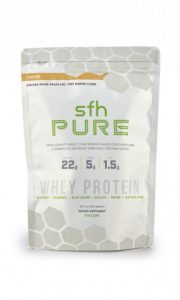There are a few things that need to happen in order to produce muscle growth. You need to use significant load when lifting weights Enough time under tension to create structural damage to the muscle tissue Enough stimuli to up-regulate anabolic hormones and increase protein synthesis Proper recovery and workout nutrition Many people often think that if they lift as heavy as possible, or use as much volume (sets and reps) as possible they will […]
What Type of Whey Protein are You Choosing?
By now, many of you are aware that the quality of your animal proteins is very important.The shift from consuming animal proteins that are treated poorly to sustainably raised, wild-caught, pastured-raised, grass-fed, and organic is growing fast. Many people still balk at the price of higher-quality animal protein sources. I feel that it is well worth the cost. It all comes down to prioritizing your grocery list and cutting out the “junk” that you used to buy and saving money that way so that you can afford high-quality animal protein sources.
- If you come at it from the nutritional angle, grass-fed wins across the board.
- Maybe you’re more concerned with the ethics of animal husbandry, grass-fed animals live overall better lives than animals in concentrated feedlots.
- If you worry about the use of antibiotics in agriculture and the rise of antibiotic-resistant bacteria, grass-fed animals receive less medication (and sometimes none).
Whatever your inclination, animals who range free and nibble their biologically appropriate diet of various grasses tend to be happier and healthier. Grass-fed animals produce more nutrient-dense meat, milk, and fat than their counterparts. It’s objectively “better.” Even if you are a vegan you can’t argue with treating animals better that we end up eventually consuming.
Omega-3 Fatty Acid, Antioxidant Content, and Immunoglobulins
When it comes to dairy products, in this case, grass-fed and organic whey protein, that is some strong evidence that grass-fed has a higher overall nutrient value.
- Grass-fed whey contains up to 50% more critical omega-3 fatty acids that traditional dairy.
- It also has a higher antioxidant profile to reduce free radicals than conventional dairy.
While whey protein is all about the protein and not the fat content, quality still matters. The amino acid profile of grass-fed whey and conventional whey are very similar. Though if quality and ethics of treating cows better matters to you, then consuming grass-fed whey should be important.
Grass-fed whey protein and other dairy products have a higher content of immunoglobulins. These are special proteins that can act as transporters of antibodies within your body. Immunoglobulins combat viruses, bacteria, and other foreign invaders. Immunoglobulins have been used to treat chronic fatigue syndrome, anemia, hepatitis A, arthritis and many other diseases and can help build up your immunity against damaging microorganisms and toxins. So while it may not directly increase fat loss or muscle gain (the main reasons people consume protein supplements typically), it will enhance your health. Thus, contributing to the overall game of feeling and looking better.
I didn’t find studies that showed grass-fed whey would help you recover faster, build bigger muscles, or help you lose weight faster. Again, the protein content is extremely similar. If you are only worried about losing fat, gaining muscle, and recovering from your workouts, grass-fed to conventional doesn’t make much of a difference. (Except maybe the glutathione content, which is an antioxidant that can help improve recovery thus helping build muscle and burn fat, and increase immune system function. But again, I did not find a lot of data on this).
Lactose Content
Lactose Content is a major concern for many people as it is estimated that over 65% of the human population has some form of lactose intolerance. While there are trace amounts of lactose in whey protein, many people seem to be able to tolerate it if it is a high-quality source. The problem with most protein powders is that they have a low standard. The brand I recommend; Stronger, Faster, Healthier (SFH).
of lactose in whey protein, many people seem to be able to tolerate it if it is a high-quality source. The problem with most protein powders is that they have a low standard. The brand I recommend; Stronger, Faster, Healthier (SFH).
SFH products have all of their products go through the most rigorous testing. This is to make sure purity, quality, and potency are of the highest standard. Make sure that the grass-fed whey or any whey protein you consume for that matter goes through the NSF testing and has an NSF label on it. 
You can also visit Labdoor.com (https://labdoor.com/rankings/protein), to see how each whey protein stacks up as far as quality is concerned to see if the whey protein that you are consuming is in the top 25, which I recommend. This will decrease the odds that the supplement wasn’t filled with a bunch of filler ingredients. As a result, decreasing fillers decrease the chance of having much lactose.
Grass-fed Whey Protein Alternatives
Not everyone wants to consume dairy or any other animal products for that matter. I do feel that grass-fed whey protein provides a lot of health and performance benefits. However, it is not a must-have. I also feel that it does provide more of a complete amino acid profile. Also more evidence of building muscle. burning fat, and improving recovery than plant-based proteins. That does not mean that there are not great plant-based protein powders out there.
Hemp seed protein and pea protein are my favorites plant-based protein powders. There are also other proprietary blends of various nuts, seeds, and beans that are made into a powder form that you can substitute grass-fed whey protein for in your daily super shake.
So if you are someone looking to increase your protein intake and you do not eat dairy or animal products, there are many other ways to get enough protein in your diet.
Wrapping It Up
Grass-fed whey protein offers an array of benefits beyond post-workout nutrition. Whey protein is the most efficient way to get adequate amounts of protein in someone’s diet. Finding a high-quality piece of animal protein when on the go can be very challenging at times.
Many of our animal protein sources are not as high of quality as we would like them to be. Consumers are now more aware of this. High-quality animal protein sources can also be very expensive. Whey protein (I prefer grass-fed) is an excellent source of protein that is high in quality. Grass-fed whey is safe for many lactose intolerant people. Additionally, it provides a ton of essential amino acids at a low cost.
These are just some of the many benefits that supplementing with whey protein can offer. Overall, grass-fed whey protein is a healthy and highly accessible source of protein. It can help improve many aspects of a person’s health.
Keep in mind, whey protein is NOT only for those looking to “bulk up.” Whey protein is just like any other protein. For pre and post-workout nutrition, it can be utilized as part of a meal or a snack. Use grass-fed whey protein just like you would any other protein source. My favorite is when making a super shake.
Below is a quick recap of the major benefits of grass-fed whey protein (with links to references and studies):
• Helps build lean muscle tissue
• Improves strength
• Improves fat loss
• Has anti-cancer properties, such as glutathione
• Can help reduce blood pressure
Cost breakdown of SFH Grass-fed whey
Cost per bag: $44 for 30 servings
Grams of protein per serving: 23 grams
Cost per serving: $1.46
Recommended servings per day: 1-3 depending on your individual protein demands










Leave a Reply